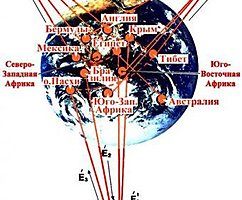Blu-ray discs will help to increase the efficiency of solar panels
 Bashny.Net
Bashny.Net

As far as Blu-ray discs can be useful? Now this is one way of storing your favorite movies and TV shows with high resolution, thanks to the technology of data storage with high density.
But according to a new study at northwestern University, Illinois, Blu-Ray discs can improve the performance of solar panels is a great option to use unnecessary drives.
The interdisciplinary research team found that the physical location is recorded on the disc information — no matter whether it is a popular scientific film, or the cartoon "family Guy" — works well for improving light absorption across the solar spectrum.
"We had a hunch that Blu-Ray discs can help to improve solar panels, and to our delight, we found that existing models do it very well," says Jiaxing Huang, a chemist and Professor of materials science and engineering at school of engineering and applied science McCormick. "It's as if electrical engineers and scientists of computer technology in the development of technology Blu-Ray subconsciously doing our jobs".
Blu-Ray discs have a higher density per unit area than the DVDs, and have this quasi-random pattern of location information, sovershenstvovaniya engineers for decades, which, being repeated on the solar panels, provides the right texture to improve the light absorption and performance of cells.

Working with Cheng San (Cheng Sun), associate Professor of technology and engineering schools McCormick, Huang and his team tested a wide range of films and TV shows recorded on Blu-Ray discs, including action films, drama, documentary films, etc., and found that video content doesn't matter. Everything works equally well for improving light absorption in solar cells.
The results were published November 25 in the journal Nature Communications.
In the industry of solar cells it is known that if some kind of texture to be placed on the surface of the solar panel, the light is scattered more efficiently, increasing the efficiency of the cell. Scientists have been searching for the most suitable texture with a reasonable manufacturing cost.
Northwestern University demonstrated that binary binary code Blu-Ray discs 1 and 0 applied to the land so that (gaps) and pits (depressions) to store video information, give near-optimal surface texture to improve absorption of the broad spectrum of sunlight.
In their paper, the researchers first selected the Jackie Chan movie "Supercop". They repeated texture on the active layer of polymer solar cells and found that cells became much more efficient in comparison with the control cells with a random texture on the surface.
"We discovered that randomly the texture works much better than without its use, but Blu-Ray was the best," says Juan. "Then I wondered, why does it work? If you don't understand the why, then it's not a real science".
Huang long puzzled until his wife Lee Shaorong (Shaorong Liu), engineer databases from IBM, assumed the existence of a process of data compression. It was the understanding necessary to Juan and he took up the study of this theory.
The researchers carefully reviewed the data processing algorithms in the Blu-Ray standard and noted two main purposes which they serve:
— Achieving the highest degree of compression by converting video signals into a seemingly random sequence of 0 and 1.
— Increase tolerance to error, adding redundant information in the sequence data, which also limited the number of 0's and 1's.
According to the researchers, the persecution of these goals and appears quasi-random array and put them pits with sizes ranging from 150 to 525 nanometers. And as it turns out, these dimensions work perfectly, refracting light in all the visible spectrum of solar radiation.
According to the report of researchers, the increase in the total absorption of light by the solar panel with the application of Blu-ray texture 21.8 percent.
"In addition to improving polymer solar panels, our modelling suggests that the Blu-ray texture can easily be applied to other types of solar panels".
Source: facepla.net
Tags
See also
Scientists have increased the efficiency of the translucent solar panels
The list of the most efficient solar panels
The record conversion efficiency of sunlight into electricity
35%: new record efficiency solar cells put Australian scientists
New productive and cheap way to store solar energy
New technology can improve the efficiency of fuel cells at 4 times
The efficiency of solar cells.
Why sleep in a cold useful? 5 reasons that will convince you to reduce the temperature in the bedroom.
Where and how do the most expensive metal in the world
Marine energy China
















